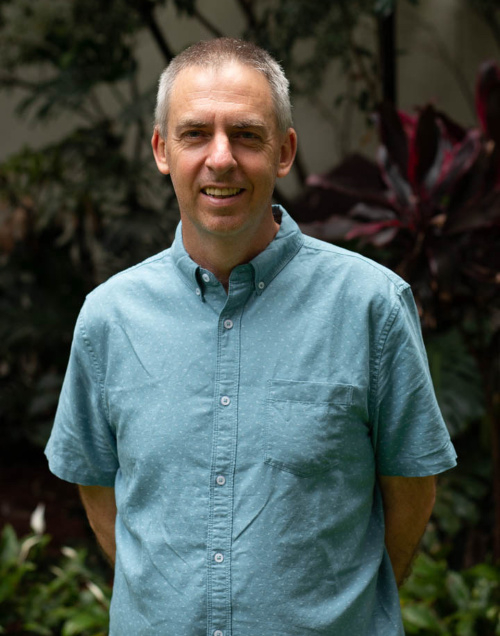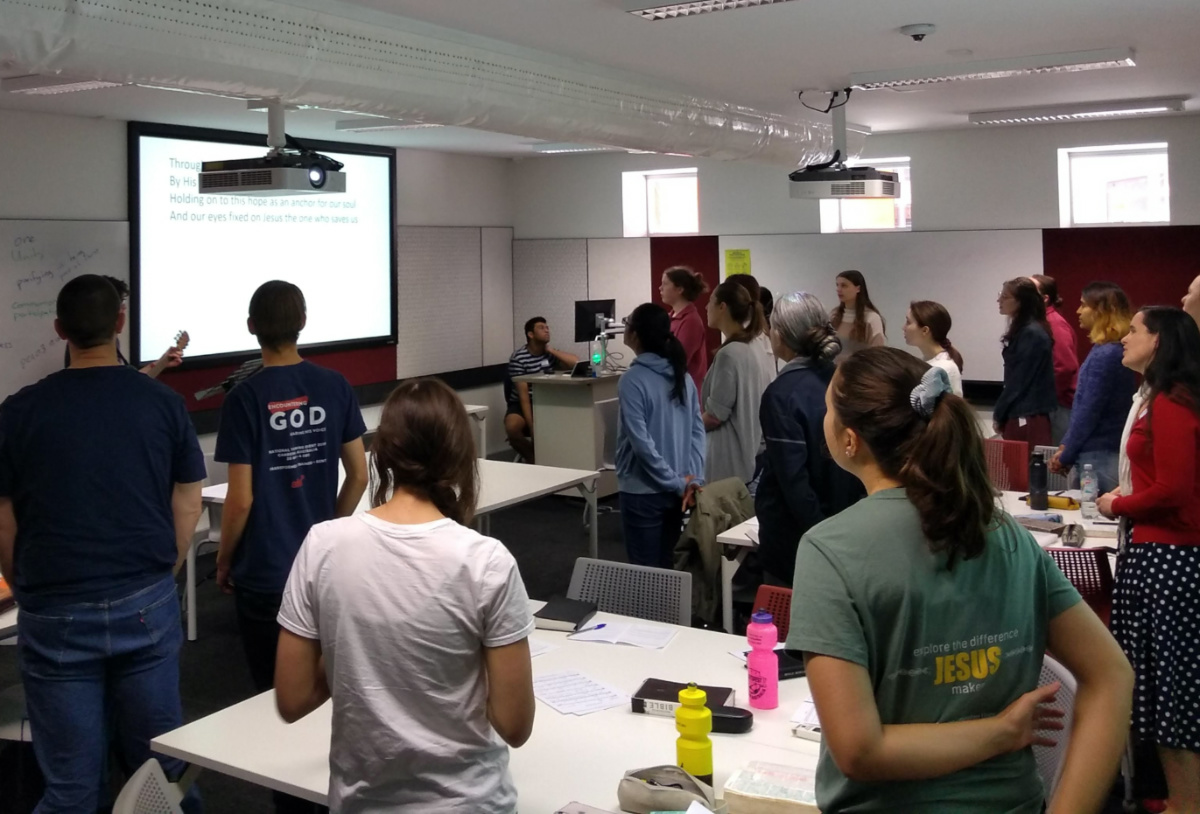
PETA MCCARTNEY reports on how evangelical ministries at Australian universities have weathered the COVID-19 storm…
Sydney, Australia
The decision not to try and engage with students using online forums during the COVID-19 pandemic seems counter-intuitive to the evangelical ethos of Christian organisation Credo at the University of Technology Sydney.
But that’s just what happened this year, as staff and leaders continued to adapt to the challenges the pandemic presented to their ministry of proclaiming the Gospel as international students were blocked from entering the country and online classes replaced face-to-face tutorials and lectures.

Some of the Credo team at a UTS open day. PICTURE: Supplied.
Paul Winch is campus director of Credo at UTS, where he studied IT and was a Credo student leader before attending Moore College and accepting the Credo leadership role in 1998.
In autumn 2020, Credo – which operates under the umbrella of the Australian Fellowship of Evangelical Students network – managed one week on campus before lockdown, and Winch says their initial response to the changed circumstances was to try to “replicate everything we do on campus, online”.

Paul Winch, campus director of Credo at UTS.
“When we got to this year, we decided not to do any online ministry at the start of the year, because even though the university was still running lectures on the internet, we just decided that people were looking for more face-to-face contact – and there was still more discretionary time for them in terms of how to use their days.”
– Paul Winch
“There was a lot of nervous energy. It was all new…but we quickly realised that that wasn’t possible in terms of screen fatigue, mental space – all sorts of things,” he said. “I could characterise spring last year as pared back a little bit, but mostly online, with some hybrid activities. So we were able to get onto campus a little bit.”
As 2021 began, there was an opportunity to reassess what the team would do; how to best engage with students, and shift the way they had been doing things.
“When we got to this year, we decided not to do any online ministry at the start of the year, because even though the university was still running lectures on the internet, we just decided that people were looking for more face-to-face contact – and there was still more discretionary time for them in terms of how to use their days,” Winch said.
The decision not to continue online engagement was unorthodox and led to some interesting results in terms of outreach, developing relationships and evangelism.
Winch says that with less paid work to tie them down, students looked to attend more of Credo’s on campus talks and the small groups on offer led to deeper connections.
“It was a case of the smaller the better. Smaller groups allowed us deeper connection between people,” he said, while there was also more flexibility about timing of programs which was useful and helpful.
“We have had [a few] more people become Christians last year than the year before,” he said, adding it was a combination of [in lockdown] people being able to access programs such as Credo’s ‘Explore’ groups that were hosted at convenient times for them.
“So it was some pragmatics [with people having more discretionary time], but it was also some existential stuff as well, as in people were looking for answers to questions that the pandemic raised.”

A gathering of the Curtin Christian Union. PICTURE: Supplied.
On the other side of the country, in Perth, Western Australia, there have been fewer COVID-19 outbreaks and fewer restrictions and lockdowns. But surprisingly, classes at Curtin University remain mostly online, which has presented greater challenges for Curtin Christian Union staffers to engage with students, particularly internationals.
The Department of Education, Skills and Employment has released data showing there were 529,580 international students for the year to June, 2021, down 17 per cent when compared to 2020.
Rev David Mitchell is staff team leader at CCU, another AFES offshoot, a position he has held for just over two years.
Like Winch, he says Australia’s closed borders have had a huge impact on outreach to international students, who he expects will be allowed back to Australia from 2022.
“International student ministry really took a nosedive. It’s been very difficult,” Mitchell said. “[But] I suspect it’s just a matter of being turned back on for international student arrivals and I think that will happen at the start of next year. In that regard we are just sort of keeping enough of the structures going so that we have something to invite people to.”
The team has experienced other challenges, too, with fewer local students attending weekly Bible discussions, or willing to commit to regular weekly programs, and the number of male students also down. While there was a lot happening on campus, “most lectures are still online, or at least have got a completely online option even if you can go in person”, so campus was quieter than it was since second semester 2019, prior to the first wave of COVID-19, Mitchell said.
“I get the impression students are working [in paid jobs] more,” he said. “We have a few students who are quite involved with what we are doing, but they will be effectively working, not just casually, but part-time hours.”
As well, this semester they had fewer than 100 students at their Bible talks, “whereas in 2019 – the first two weeks I think we had over 100”.

David Mitchell, staff team leader at Curtin Christian Union. PICTURE: Supplied.
“I think the hardest part is where we don’t have as many people at any one event. Trying to get everyone in the same room is harder than before.”
– David Mitchell, staff team leader at Curtin Christian Union in Western Australia.
“What I am not sure [about] is, whether that’s what it is now or have we lost people because of COVID-19? Can we do something to change that or is that the nature of what our ministry looks like for now?”
Students also were less inclined to commit to programs involving regular weekly sessions, which had forced the team to resort to “mini conferences”.
“I think the hardest part is where we don’t have as many people at any one event. Trying to get everyone in the same room is harder than before,” he said.
Mitchell felt that COVID-19 may have “amplified” this issue, but it was harder to get students to commit to short course material week-by-week on campus.
“They don’t want to make a commitment to come every week for the next six weeks, so they don’t make a commitment to come at all, so one thing we have changed is to say, ‘instead of trying to run a weekly training course, let’s do two training days this semester’ and make it like a one day mini-conference type event and see if we can get some more buy-ins and more engagements doing things that way.”
One other area where he said they “have to potentially work harder” is to try and engage male students.
“We have noticed that we have had about half the number of male students as compared to female students at different activities and events this year.”
One small success in the early part of the pandemic in 2019 was linking CCU members to others who lived nearby or in the same community, which Mitchell said could emerge as a valuable tool once borders reopen nationally and internationally.
Winch said even though they saw an overall contraction in numbers of students – Credo was smaller this year than pre-pandemic – there were some areas where there was higher engagement levels.
“[For example] our public talks and again, I think it was mainly because pre-pandemic, people would come if they could fit them in between classes or work, [or whatever] whereas this year it was much more, ‘I’m going to decide to go to that’ [and] so they would come into Uni that day and do some study and go to Credo.”
The team still remains in touch with many international students with which it has previously established a relationship, but Winch admits it has been difficult to link up with those who enrolled this year and are yet to arrive in Australia to begin their studies.
“We are able to reach some who are offshore, but it’s almost exclusively one-on-one” using phone calls or social media links to stay in touch, mostly with those who had already been in Australia, either undertaking further study or transitioning from high school to university.
As vaccination rates continue to climb in Australia and restrictions ease, it is likely that normal life will return in the coming months, possibly providing a way forward for evangelical student organisations to return to proclaiming the Gospel on campuses around the country. But that remains to be seen.
Sight contacted AFES headquarters, as well as the evangelical group Power to Change, but was unable to elicit a response for this article.





